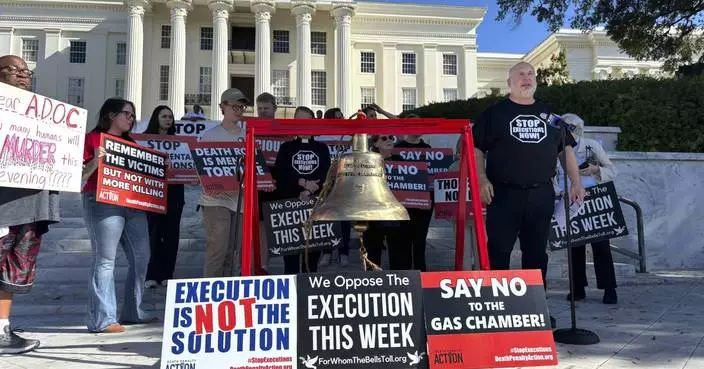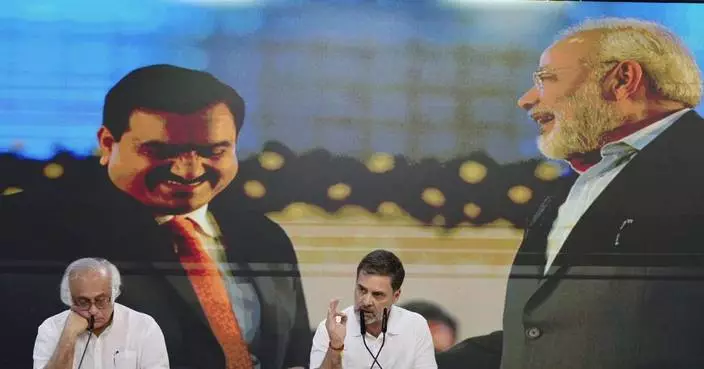NEW YORK (AP) — For about 50 years, adding cavity-preventing fluoride to drinking water was a popular public health measure in Yorktown, a leafy town north of New York City.
But in September, the town’s supervisor used his emergency powers to stop the practice.
The reason? A recent federal judge’s decision that ordered U.S. regulators to consider the risk that fluoride in water could cause lower IQ in kids.
“It’s too dangerous to look at and just say ‘Ah, screw it. We’ll keep going on,’” said the town supervisor, Ed Lachterman.
Yorktown isn’t alone. The decision to add fluoride to drinking water rests with state and local officials, and fights are cropping up nationwide.
Communities in Florida, Texas, Oregon, Utah, Wyoming and elsewhere have debated the idea in recent months — the total number is in the dozens, with several deciding to stop adding it to drinking water, according to Fluoride Action Network, an advocacy organization against water fluoridation. In Arkansas, legislators this week filed a bill to repeal the state’s fluoridation program.
The debates have been ignited or fueled by three developments:
—In August, a federal agency reported “with moderate confidence” that there is a link between high levels of fluoride exposure — more than twice the recommended limit — and lower IQ in kids.
—In September, the federal judge ordered the U.S. Environmental Protection Agency to further regulate fluoride in drinking water because high levels could pose a risk to the intellectual development of children.
—This month, just days before the election, Robert F. Kennedy Jr. declared that Donald Trump would push to remove fluoride from drinking water on his first day as president. Trump later picked Kennedy to run the Department of Health and Human Services.
In Durango, Colorado, there was an unsuccessful attempt to stop fluoridating the water during Trump’s first term in office. A new push came this year, as Trump saw a surge of political support.
“It’s just kind of the ebb and flow of politics on the national level that ultimately affects us down here,” said city spokesman Tom Sluis.
Fluoride strengthens teeth and reduces cavities by replacing minerals lost during normal wear and tear, according to the U.S. Centers for Disease Control and Prevention. In 1950, federal officials endorsed water fluoridation to prevent tooth decay, and the addition of low levels of fluoride to drinking water has long been considered one of the greatest public health achievements of the last century.
Fluoride can come from a number of sources, but drinking water is the main source for Americans, researchers say. Nearly two-thirds of the U.S. population gets fluoridated drinking water, according to CDC data.
There is a recommended fluoridation level, but many communities exceed that, sometimes because fluoride occurs naturally at higher levels in certain water sources.
Opposition is nothing new, though for decades it was considered a fringe opinion. Adherents included conspiracy theorists who claimed fluoridation was a plot to make people submissive to government power.
Health officials could point to studies that showed that cavities were less common in communities with fluoridated water, and that dental health worsened in communities without it.
But fluoride isn't just in water. Through the years it became common in toothpaste, mouthwash and other products. And data began to emerge that there could be too much of a good thing: In 2011, officials reported that 2 out of 5 U.S. adolescents had at least mild tooth streaking or spottiness because of too much fluoride.
In 2015, the CDC recommended that communities revisit how much they were putting in the water. Beginning in 1962, the government recommended a range of 0.7 milligrams per liter for warmer climates where people drink more water to 1.2 milligrams in cooler areas. The new standard became 0.7 everywhere.
Over time, more studies pointed to a different problem: a link between higher levels of fluoride and brain development. The August report by the federal government’s National Toxicology Program — summarizing studies conducted in Canada, China, India, Iran, Pakistan and Mexico — concluded that drinking water containing more than 1.5 milligrams of fluoride per liter was associated with lower IQs in kids.
“There’s no question that fluoride prevents cavities,” said Dr. Tom Frieden, who was director of the CDC when the agency changed the recommended fluoride levels. “There’s also no question we’re getting more fluoride than we were 50 years ago, through toothpaste and other things.”
Frieden said “a legitimate question” has been raised about whether fluoride affects brain development, and studies making that link “need to be looked at carefully.”
Many people in health care strongly embrace water fluoridation. The American Dental Association and the American Academy of Pediatrics reaffirmed their endorsement of current CDC recommendations in the wake of the federal report and the judge’s ruling.
Colorado’s health department, which weighed in during a Nov. 5 Durango city council meeting, said in a statement that it “seeks to align its public health recommendations with the latest scientific research. The facts of this court ruling are not sufficient” to revise current fluoridation levels.
Durango officials are waiting to see what the EPA does in reaction to the recent court decision, said Sluis, the city spokesman.
“We follow the science,” he said. “It wouldn’t be in the best interest of the city to stop fluoridation based on one judge’s interpretation.”
In Yorktown, Lachterman concluded the judge’s decision was enough to halt fluoridation. He recalled a community discussion several years ago in which most people in the room clearly favored fluoridation, but recently it seems public comment has reversed.
“It’s like a total 180,” he said.
But not all public pressure these days is against the idea.
In September, Buffalo, New York, announced it would resume water fluoridation after not having it for nearly a decade. News reports had described an increase in tooth decay and families sued, seeking damages for dental costs.
The Buffalo Sewer Authority’s general manager, Oluwole McFoy declined to discuss the decision with The Associated Press, citing the litigation.
For its part, the EPA “is in the process of reviewing the district court’s decision,” spokesman Jeff Landis said this week.
In Monroe, Wisconsin, fluoridation “has become a very hot issue,” said its mayor, Donna Douglas.
The small city, near Madison, started fluoridating its drinking water in the early 1960s. But in the late summer, some residents began calling and emailing Douglas, saying she needed to do something about what they saw as a public health danger. The first call “was more like a threat,” she recalled.
Douglas said she did not take a position on whether to stop, but decided to raise it to the city council for discussion. The discussions were unusually emotional.
Few people tend to speak during public comment sessions at council meetings, said Douglas. But more than two dozen people spoke at a city council meeting last month, most of them in favor of fluoridation. At a subsequent meeting, about a dozen more people — all opposed to fluoridation — came out to speak.
“This is the first time we’ve had any debates at all” like this, Douglas said. “I didn’t realize it would be such a heated discussion.”
AP video journalist Brittany Peterson and AP reporter Andrew DeMillo contributed to this report.
The Associated Press Health and Science Department receives support from the Howard Hughes Medical Institute’s Science and Educational Media Group. The AP is solely responsible for all content.

Residents attend a Durango City Council meeting to speak about the continued fluoridation of the city's drinking water, Nov. 5, 2024, in Durango, Colo. (Christian Burney/The Durango Herald via AP)
THE HAGUE (AP) — The world’s top war-crimes court issued arrest warrants Thursday for Israeli Prime Minister Benjamin Netanyahu, his former defense minister and Hamas’ military chief, accusing them of crimes against humanity in connection with the 13-month war in Gaza.
The warrants said there was reason to believe Netanyahu and former Defense Minister Yoav Gallant have used “starvation as a method of warfare” by restricting humanitarian aid and have intentionally targeted civilians in Israel’s campaign against Hamas in Gaza — charges Israeli officials deny.
The action by the International Criminal Court came as the death toll from Israel’s campaign in Gaza passed 44,000 people, according to local health authorities, who say more than half of those killed were women and children. Their count does not differentiate between civilians and combatants.
Experts say hunger has become widespread across Gaza and may have reached famine levels in the north of the territory, which is under siege by Israeli troops.
Netanyahu condemned the warrant against him, saying Israel “rejects with disgust the absurd and false actions” by the court. In a statement released by his office, he said: “There is nothing more just than the war that Israel has been waging in Gaza.”
Gallant, in a statement, said the decision "sets a dangerous precedent against the right to self-defense and moral warfare and encourages murderous terrorism.”
The decision turns Netanyahu and the others into internationally wanted suspects and could further isolate them, putting them at risk of arrest when they travel abroad. Its practical implications could be limited since Israel and its major ally, the United States, are not members of the court.
Still, the warrant marked the first time that a sitting leader of a major Western ally has been accused of war crimes and crimes against humanity by a global court of justice. It put Israel's allies, including some of its closest European friends, in an awkward position. Several leaders, including France, welcomed the court's decision and signaled they might arrest Netanyahu if he visited.
The move “represents the most dramatic step yet in the court’s involvement in the conflict between Israel and Hamas," said Anthony Dworkin, senior policy fellow at the European Council on Foreign Relations.
Israeli leaders, politicians and officials across the spectrum denounced the warrants and the ICC. The new defense minister, Israel Katz, who replaced Gallant earlier this month, said Thursday’s decision is “a moral disgrace, entirely tainted by antisemitism, and drags the international judicial system to an unprecedented low.”
Human rights groups applauded the move.
The warrants against both sides “break through the perception that certain individuals are beyond the reach of the law,” the associate international justice director at Human Rights Watch, Balkees Jarrah, said in a statement.
The decision came six months after ICC Chief Prosecutor Karim Khan requested the warrants.
The court issued a warrant for Mohammed Deif, head of Hamas’ armed wing, over the Oct. 7, 2023, attacks that triggered Israel’s offensive in Gaza. It said it found reasonable grounds to believe Deif was involved in murder, rape, torture and the taking of hostages amounting to war crimes and crimes against humanity.
In the Hamas-led attack, militants stormed into southern Israel, killing 1,200 people — mostly civilians — and taking some 250 others hostage. Around 100 Israelis remain captive in Gaza, around a third of them believed to be dead.
Khan withdrew requests for warrants for two other senior Hamas figures, Yahya Sinwar and Ismail Haniyeh, who have both since been killed. Israel says it also killed Deif in an airstrike, but Hamas has never confirmed his death.
The warrants for Netanyahu and Gallant were issued by a three-judge panel in a unanimous decision. The panel said there were reasonable grounds to believe that both men bear responsibility for the war crime of starvation and the crimes against humanity of murder, persecution and other inhumane acts.
The judges said the lack of food, water, electricity, fuel and specific medical supplies created conditions “calculated to bring about the destruction of part of the civilian population in Gaza,” including the deaths of children due to malnutrition and dehydration.
They also found that by preventing hospital supplies and medicine from getting into Gaza, doctors were forced to operate, including performing amputations, without anesthesia or with unsafe means of sedation that led to “great suffering.”
The judges also rejected an Israeli petition challenging the court’s jurisdiction on the grounds that Israel is not a member state in the tribunal.
Despite the warrants, none of the suspects is likely to face judges in The Hague anytime soon. Member countries are required to detain suspects facing a warrant if they set foot on their soil, but the court has no way to enforce that.
For example, Russian President Vladimir Putin, who is wanted on an ICC warrant for alleged war crimes in Ukraine, recently visited Mongolia, a member state in the court but also a Russian ally. He was not arrested.
Still, the threat of arrest now complicates any travel abroad by Netanyahu and Gallant — including to close allies of Israel. EU foreign policy chief Josep Borrell said the warrants are binding on all 27 members countries of the European Union.
France signaled it could arrest Netanyahu if he came to its territory. Foreign Ministry spokesman Christophe Lemoine called it a “complex legal issue” but said France supports the court’s actions.
“Combating impunity is our priority,” he said. “Our response will align with these principles.”
Hamas in a statement welcomed the warrants against Netanyahu and Gallant but made no mention of the one against Deif.
Israel’s opposition leaders fiercely criticized the ICC’s move. Benny Gantz, a retired general and political rival to Netanyahu, said it showed “moral blindness” and was a “shameful stain of historic proportion that will never be forgotten.”
Yair Lapid, another opposition leader, called it a “prize for terror.”
Israel’s campaign has caused heavy destruction across Gaza, decimated parts of the territory and driven almost the entire population of 2.3 million people from their homes, leaving most dependent on aid to survive.
Two days after Hamas’ attack on southern Israel, Gallant announced a total seal on Gaza, vowing not to let in food, fuel or other supplies. Under U.S. pressure, Israel began allowing a trickle of humanitarian aid to enter a few weeks later.
Israel now says it puts no limit on the amount of supplies into Gaza. Still, the flow of food and other goods is at nearly the lowest levels of the war, and the U.N. and other groups have said Israeli military restrictions are largely to blame, along with widespread lawlessness that has led to theft of aid shipments.
The case at the ICC is separate from another legal battle Israel is waging at the top U.N. court, the International Court of Justice, in which South Africa accuses Israel of genocide, an allegation Israeli leaders staunchly deny.
Lawyers for Israel argued in court that the war in Gaza was a legitimate defense of its people and that it was Hamas militants who were guilty of genocide.
Associated Press journalists Raf Casert in Brussels, Mike Corder in The Hague and Josef Federman in Jerusalem contributed to this report.

FILE - Prime Minister of Israel Benjamin Netanyahu enters the 79th session of the United Nations General Assembly, Friday, Sept. 27, 2024. (AP Photo/Pamela Smith, File)

FILE - Israel Prime Minister Benjamin Netanyahu addresses the 79th session of the United Nations General Assembly, Friday, Sept. 27, 2024. (AP Photo/Richard Drew, File)

FILE - Israeli Prime Minister Benjamin Netanyahu, left, and Defense Minister Yoav Gallant attend a press conference in the Kirya military base in Tel Aviv, Israel, Saturday, Oct. 28, 2023. (Abir Sultan/Pool Photo via AP, File)
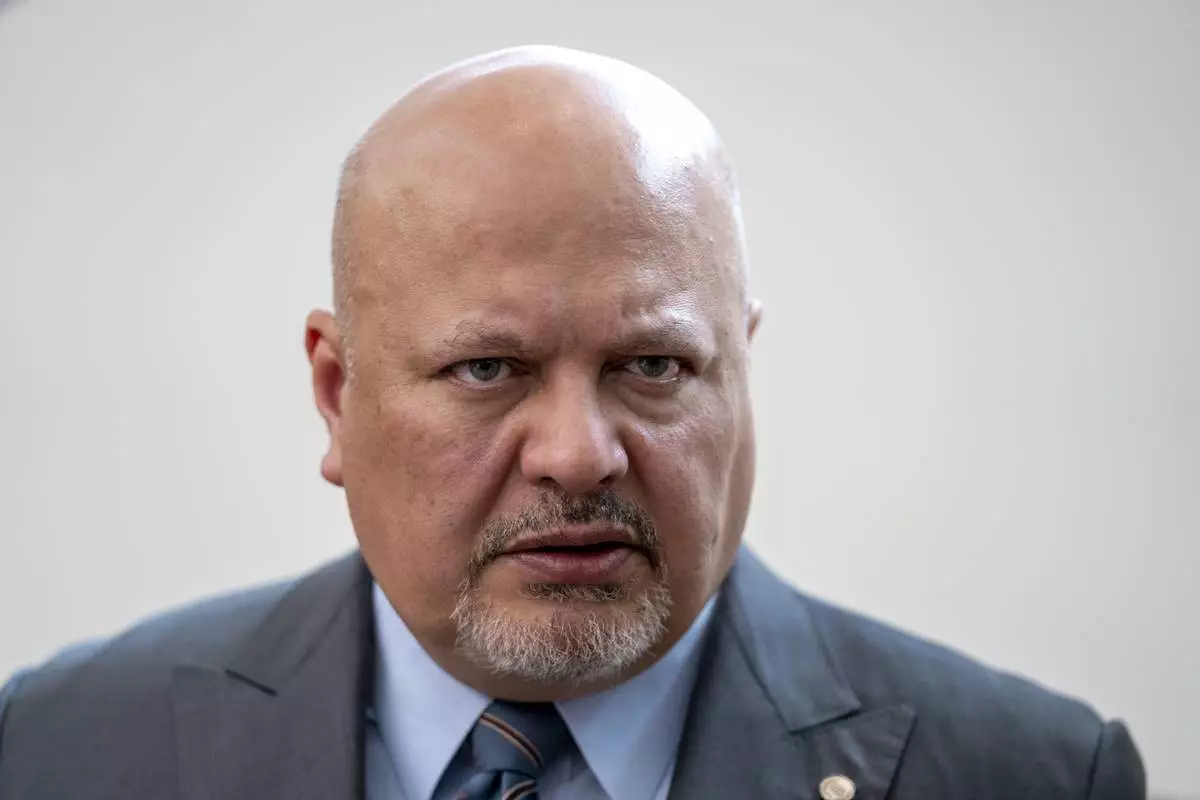
FILE - Karim Khan, Prosecutor of the International Criminal Court looks up prior to a press conference in The Hague, Netherlands, Monday, July 3, 2023. (AP Photo/Peter Dejong, File)

FILE - Yehiyeh Sinwar, head of Hamas in Gaza, attends a rally marking "Jerusalem Day," or Al-Quds Day, an annual celebration to support Palestinians in the holy city, at a soccer filed in Gaza City, on April 14, 2023. (AP Photo/Fatima Shbair, File)

FILE - Israel's Defense Minister Yoav Gallant speaks during a ceremony marking the Hebrew calendar anniversary of the Hamas attack on October 7 last year that sparked the ongoing war in Gaza, at the Mount Herzl military cemetery in Jerusalem, Israel Sunday Oct. 27, 2024. (Gil Cohen-Magen/Pool Photo via AP, File)
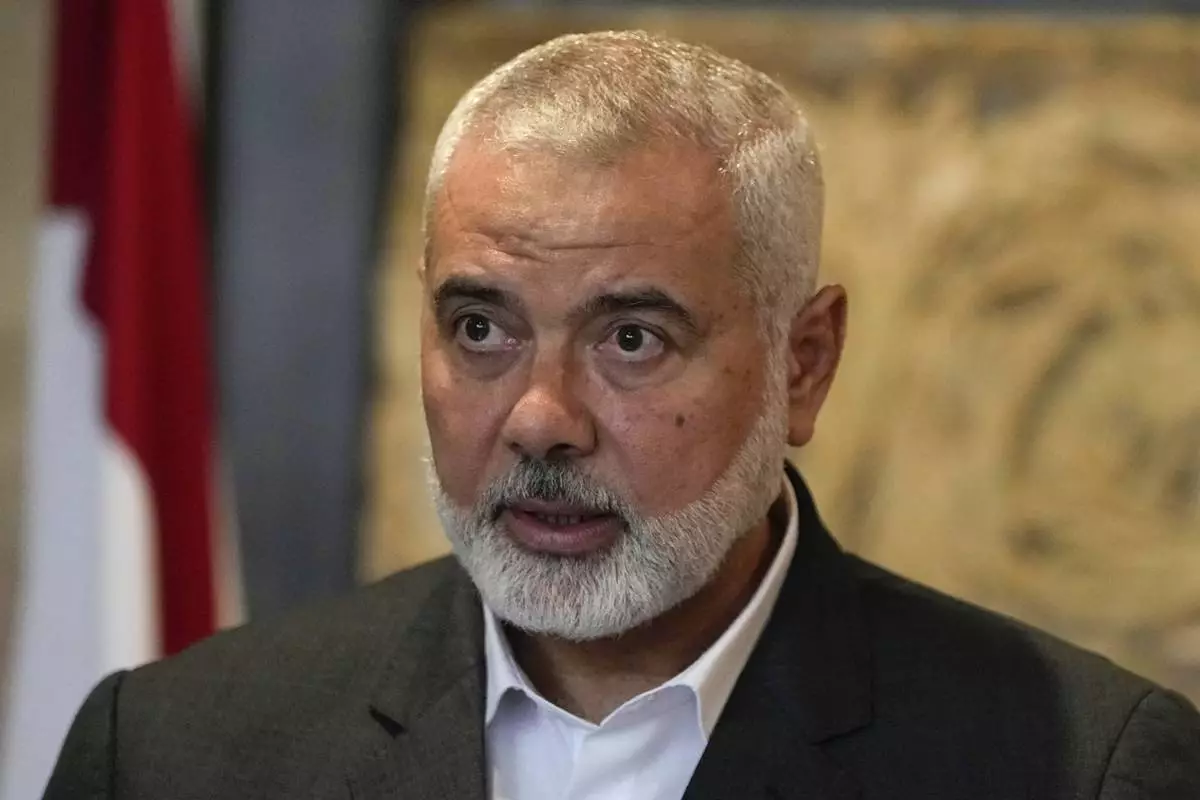
FILE - Ismail Haniyeh, leader of the Palestinian militant group Hamas, speaks to journalists after his meeting with Lebanese Parliament Speaker Nabih Berri, in Beirut, Lebanon, June 28, 2021. (AP Photo/Hassan Ammar, File)
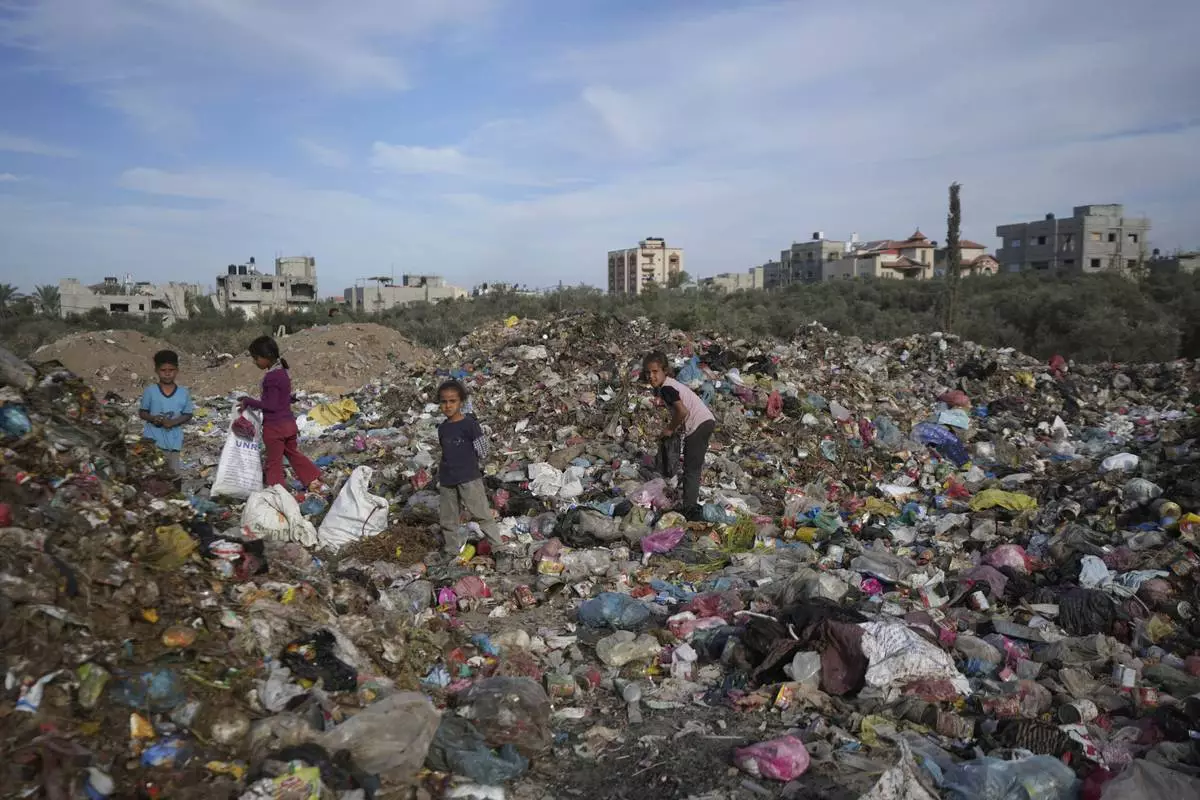
Palestinian kids sort through trash at a landfill in Zawaida, Gaza Strip, Sunday, Nov. 17, 2024. (AP Photo/Abdel Kareem Hana)

Israeli Defense Forces soldiers mourn at the grave of Sgt. First Class (res.) Roi Sasson, who was killed in action in the Gaza Strip, during his funeral at Mt. Herzl military cemetery in Jerusalem, Wednesday, Nov. 20, 2024. (AP Photo/Maya Alleruzzo)

The family of Israeli Defense Forces Sgt. First Class (res.) Roi Sasson, who was killed in action in the Gaza Strip, walk behind his coffin during his funeral at Mt. Herzl military cemetery in Jerusalem, Wednesday, Nov. 20, 2024. (AP Photo/Maya Alleruzzo)
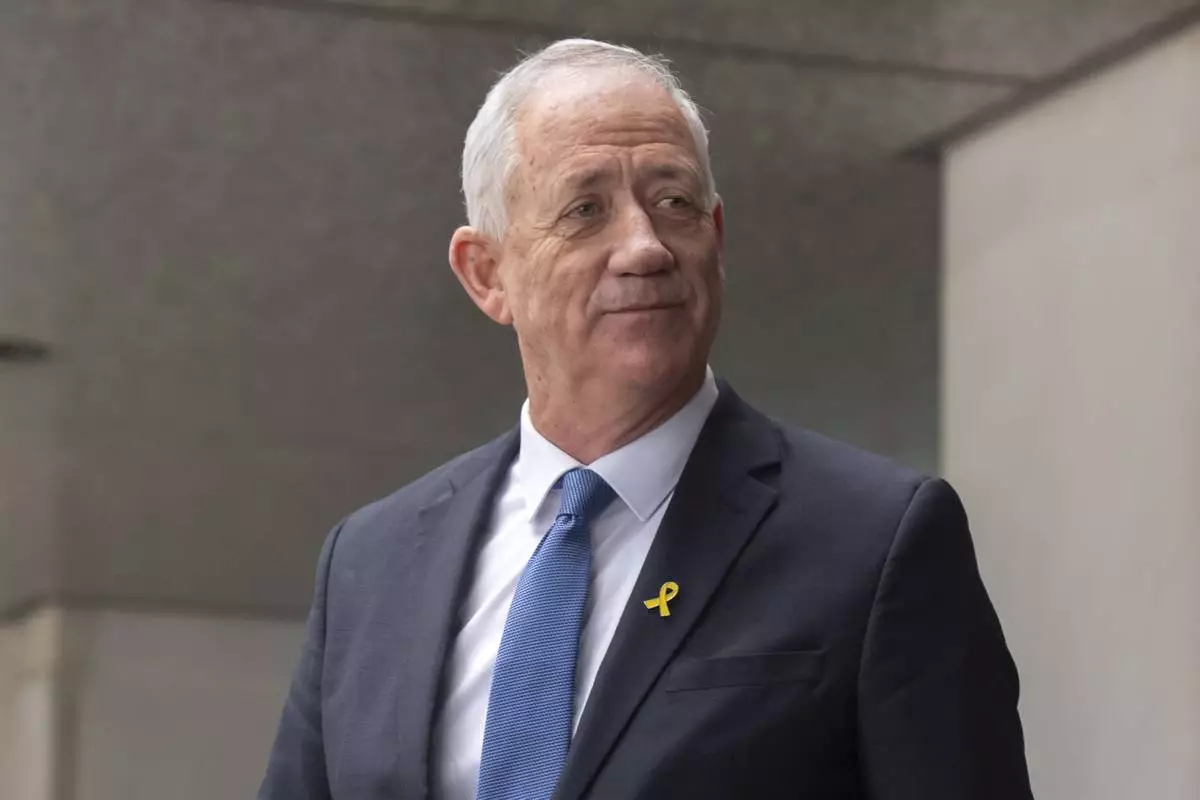
FILE - Benny Gantz, a key member of Israel's War Cabinet and the top political rival of Israeli Prime Minister Benjamin Netanyahu, leaves after a meeting at the State Department, Tuesday, March 5, 2024, in Washington. (AP Photo/Mark Schiefelbein, File)

FILE - Israel's Prime Minister Benjamin Netanyahu addresses lawmakers in the Knesset, Israel's parliament, in Jerusalem. Monday Nov. 18, 2024. (AP Photo/Ohad Zwigenberg, File)

Israel's Prime Minister Benjamin Netanyahu addresses lawmakers in the Knesset, Israel's parliament, in Jerusalem. Monday Nov. 18, 2024. (AP Photo/Ohad Zwigenberg)

















